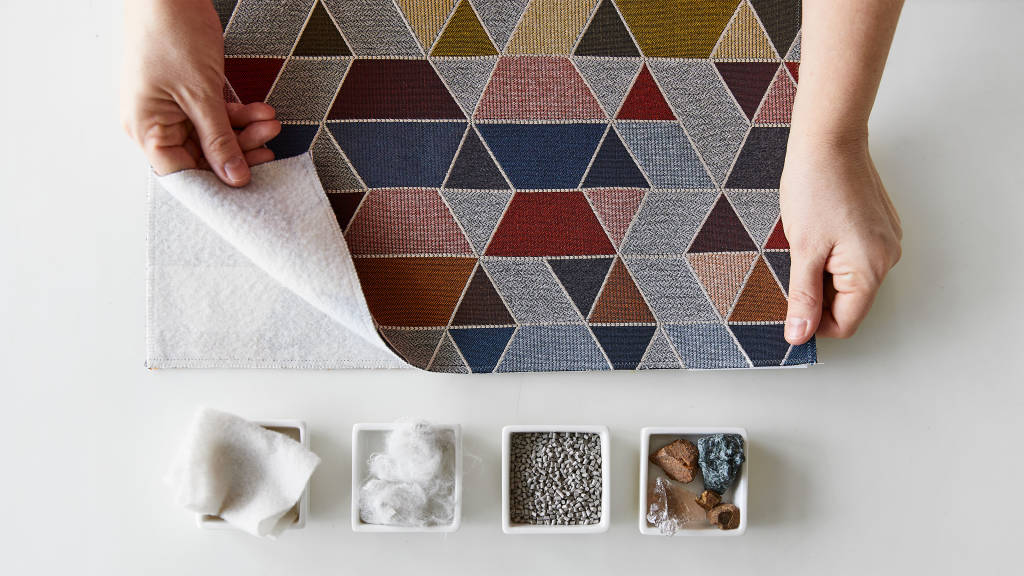
How this pup-approved textile recharges your body
By Deidre Hoguet, Director of Applied Research, Designtex
I am writing this story while sitting in a chair with an enhanced upholstery. I don’t feel too cold or too hot, scientific studies prove that my circulation is improved by eight to ten percent, and that my capillaries are vasodilated allowing more oxygen to flow to my body tissue. How can a textile improve my health while I’m sitting?
The upholstery is made with Celliant, a fiber embedded with 13 safe, naturally occurring thermo-reactive minerals, including titanium dioxide, silicone dioxide and aluminum oxide. The Celliant technology was created by Hologenix, a responsive textile company, and the fiber has been determined by the Food and Drug Administration to be a medical device and general wellness product. It increases blood flow by opening up capillaries, which promotes greater oxygen flow to cells. This improves energy and can promote alertness and overall comfort.
Multiple research and clinical trials have been conducted to prove that these claims are true. But if you don’t believe me, or these studies, just ask some dogs. We conducted a non-scientific test of Celliant, putting the fiber into dog beds and placing them next to non-Celliant dog beds. Without fail, dogs chose the Celliant beds every time!
Our work with Celliant began in 2014 when the Steelcase Materials Innovation and Exploration team (MIE) was looking at responsive fibers, or fibers that interact with their environment. The group started investigating whether the benefits of Celliant were perceptible enough to be useful in seating. Realizing the best application was in a textile form, Designtex, an MIE member, began developing an upholstery product in 2015.
With live user tests, we found that the benefits of the upholstery became apparent within minutes of sitting, raising the level of oxygenation in a user enough for that user to reap positive benefits: increased energy, increased blood flow and better thermo-regulation.
The minerals in Celliant are those found in the Earth’s crust. While we modern humans spend so much of our time indoors (90 percent on average), we are missing out on contact with these minerals in the environment. We also spend much of our day sitting (12 hours on average) and this sedentary lifestyle is spiking a host of health problems, from obesity to poor circulation.
What does this all mean? More circulation means more energy, performance and comfort, as well as a more moderate internal body temperature. While sitting on Celliant upholstery, the body is able to increase circulation, rebuild and recharge, without making changes in your normal work day (though for your health’s sake, we still encourage moving around and
getting outside).
Most people don’t think about upholstery when they’re trying to improve the health of those who sit for long periods of time. We explored how responsive textiles could increase circulation and improve health simply by sitting at your desk. This upholstery addresses wellbeing in general, and the FDA designation as a general wellness product reiterates that point. It’s great for people who spend the better part of their day sitting in front of their computers or patients who may be sitting in a treatment area for any length of time.
To achieve the widest application possible, the Designtex R&D team focused on getting Celliant into an upholstery backing, instead of the upholstery itself. That way, we can pair Celliant’s benefits with many different aesthetics, including novelty yarns, textures and even coated, faux leather materials, that are applicable for healthcare and many other markets. The durability and aesthetics of the contract fabric is not sacrificed, and we’re able to offer the widest variety of materials.
Celliant fibers emit infrared energy, which is a normal, safe wavelength, often found in sports recovery settings and infrared health saunas. It’s known to pass through walls, just as heat or sound might transfer from one room to another. We developed and tested many iterations of nonwoven backing formulation to ensure enough minerals were present and evenly distributed to pass through even thick-pile fabrics and coated textiles to reach the user.
Maybe it’s time to do a test in your office. If workers are given a choice between a Celliant or a non-Celliant chair, which will they choose?

